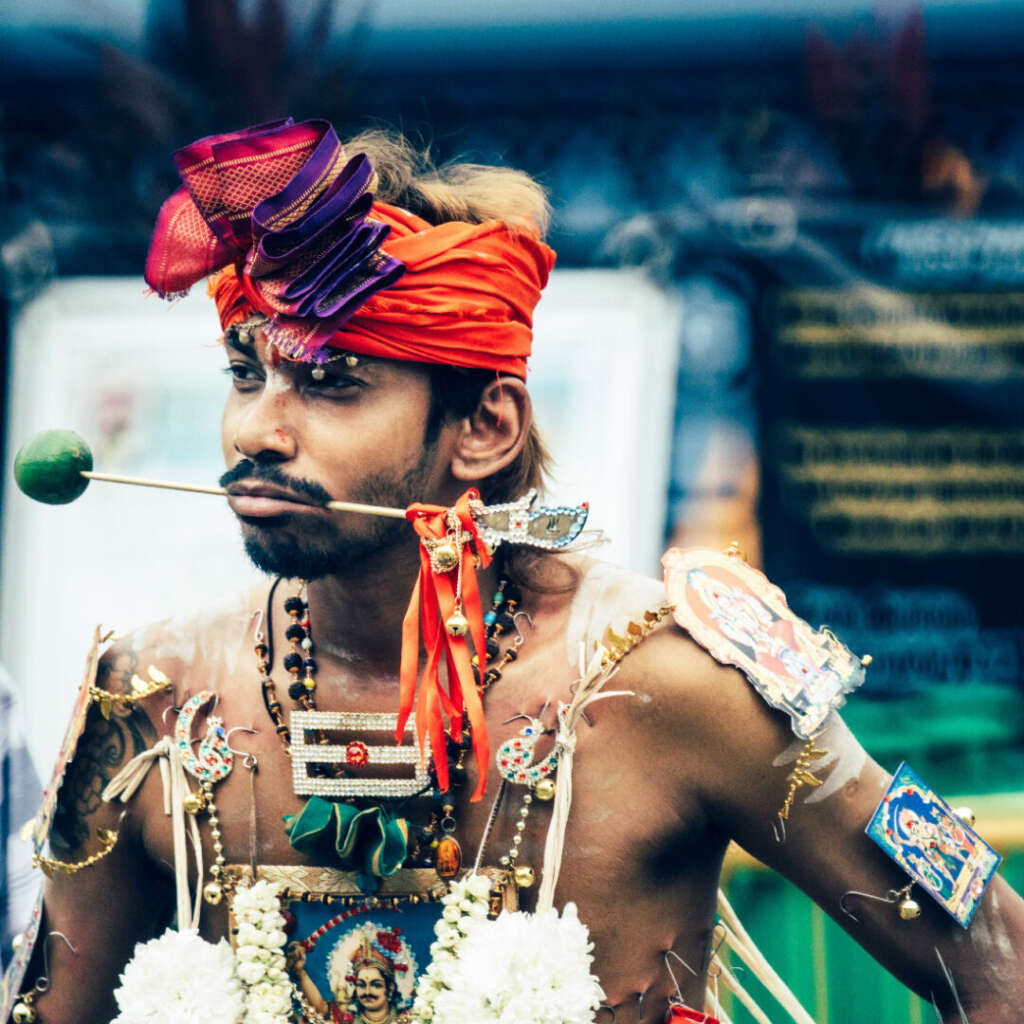For many Malaysians, we associate the Thaipusam celebration with crowds at Batu Caves and the awe-inspiring sight of kavadi bearers (a semicircular, decorated canopy supported by a wooden rod that the pilgrim carries on their shoulders to the temple).
But how many of us actually understand the significance of one of the many occasions celebrated in Malaysia? Let’s take a deeper look into the colourful celebration of Thaipusam!
1. The history of Thaipusam

Celebrated by some two million ethnic Indians in Malaysia and Singapore, Thaipusam comes from an amalgam of the words “Thai” – referring to the Tamil month of Thai (January – February) – and Pusam – the brightest star during this period.
Falling between 15 January and 15 February every year, Thaipusam is a celebration of Lord Murugan’s victory over Soorapadman’s tyranny. The Hindu festival of Thaipusam commemorates the day when Goddess Pavarti gave her son Lord Muruga an invincible lance with which he destroyed evil demons.
2. Preparations for Thaipusam
Thaipusam preparations begin months in advance. However, preparation for the festival itself starts roughly a week in advance. Before engaging in acts of penance or thankfulness, such as carrying a kavadi, devotees prepare spiritually via intense prayer and fasting.
The basic kavadi is made of a short wooden pole with a wooden arch. Peacock feathers signify Murugan because the peacock is his mascot, and margosa leaves and other materials are used to decorate it. The bodies, cheeks, and tongues of kavadi-bearers are frequently punctured with sharp skewers as a form of self-mortification.
On the other hand, women carry containers filled with gifts like fruit, flowers, and milk pots. Before 196814, when Bill No. 33/68 was implemented as part of the Holidays (Amendment) Act, 196815, Thaipusam was observed as a public holiday in Singapore. This modification was made after consultation with the Hindu Advisory Board.
kavadi meaning – The kavadi (“burden”) itself is a physical burden, the bearing of which is used by the devotee to implore Murugan for assistance, usually on behalf of a loved one who is in need of healing, or as a means of balancing a spiritual debt. Devotees process and dance along a pilgrimage route while bearing these burdens. Source: Wikipedia
3. The tenacity of Hindu devotees

The rituals of Thaipusam usually begin much earlier before the big day itself. Some devotees fast for more than a month before the occasion while others shave their heads as an act of gratitude, repentance or as a poignant plea to have prayers answered.
Devotees believe their sins can be cleansed through such acts, while also reaffirming their Hindu faith.
Traditionally, male devotees fulfil vows by piercing parts of their body before carrying a kavadi along a four-kilometre route – including piercing the skin, tongue or cheeks while some walk over burning coals.
A devotee bearing a kavadi, is a symbol of humility and devotion.
Additionally, coconuts are smashed to signify the breaking of the ego and the emergence of a purer self.
4. Witness the colourful Thaipusam at Batu Caves

In Batu Caves – one of the focal points of Thaipusam celebration in Malaysia – the procession accompanying the silver chariot bearing Lord Murugan’s idol, starts from Sri Mahamariamman, in the centre of Kuala Lumpur, to the temples of Batu Caves.
The procession usually starts before midnight on the eve of Thaipusam and is a 15-kilometre journey that can easily take 8 hours. Devotees dress in bright orange and yellow — Lord Murugan’s favourite colours — while they chant and walk to the temple.
Devotees wait for hours just to catch a glimpse of Lord Murugan on his chariot and extend their offerings while hundreds of thousands more join the procession to the temples. The number of people at Batu Caves during Thaipusam can range from 700,000 right up to 1.5 million.
At Batu Caves, devotees faithfully carry their offerings and kavadi bearers staunchly shoulder their burdens up 272 steps to the temple. Celebrations also take place in other parts of the country – include the Waterfall Temple in Penang and Kallumalai Temple in Ipoh, Perak.
To all Malaysians celebrating this colourful day, we at IQI Global wish you in advance a Happy Thaipusam! May it become a source of inspiration for all communities to continue living in harmony.
Looking for a job? It’s easy to apply as a real estate negotiator with us at IQI! Simply fill up your details below and we will contact you shortly.
